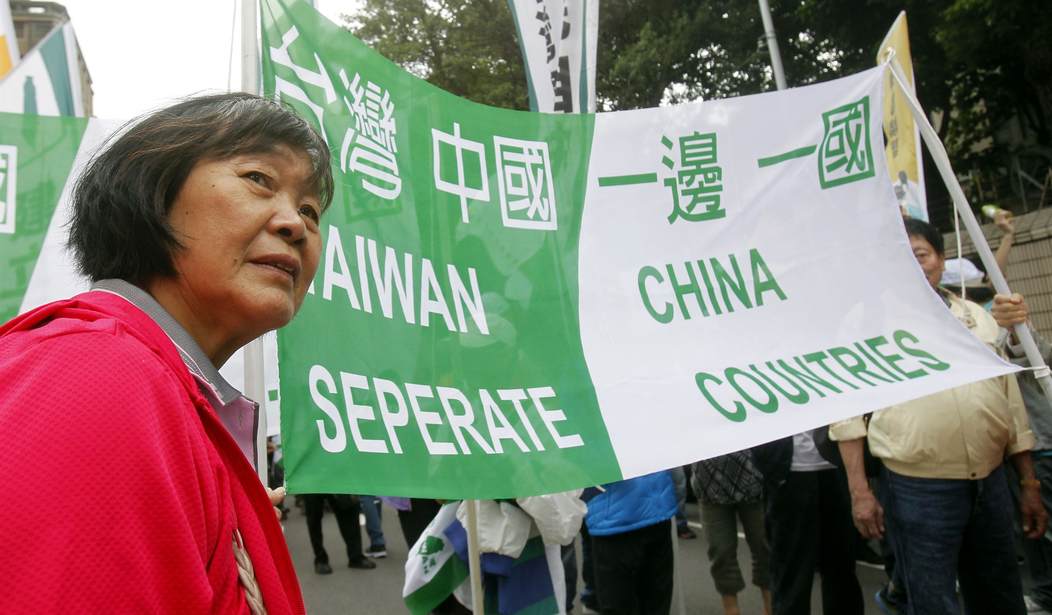I’m not one who believes war between the United States and China is inevitable. It’s certainly not unavoidable and the chances of war may even be remote. That’s because eventually, China is going to realize the United States is not going to engage in World War III just to save Taiwan’s independence. Their efforts to take Taiwan won’t involve conflict with the United States.
There’s also the matter of the improvement in the Chinese military both qualitatively and quantitatively. The correlation of forces between the United States and China is tilting toward China and will inevitably make war with the Asian giant a losing proposition for the U.S.
Eventually — sooner rather than later — China will be able to bring far more force to bear much more quickly in the Taiwan theater of operations than the United States. Would we use nukes to save Taiwan? No rational president would attempt that. Frankly, I don’t think Taiwan would expect it, either.
Gen. Michael A. Minihan, head of Air Mobility Command, warned his crews to speed up preparations for a potential conflict. AMC is responsible for servicing the Air Force’s fleet of transports and refueling aircraft around the world. Minihan sent a memo to troops under his command that was not only unusual but also gung-ho.
“I hope I am wrong,” Minihan wrote. “My gut tells me we will fight in 2025. Xi secured his third term and set his war council in October 2022. Taiwan’s presidential elections are in 2024 and will offer Xi a reason. United States presidential elections are in 2024 and will offer Xi a distracted America. Xi’s team, reason, and opportunity are all aligned for 2025.”
The general is not wrong about the facts. But we can certainly fault his analysis, which doesn’t take into account Xi’s desire to avoid a direct confrontation with the U.S. — at least until his military build-up is much farther along.
Also for our VIPs: Japan, Once a Pacifist Nation, Will Double Its Defense Budget to Face China Threat
The latest unclassified Pentagon analysis of China’s military buildup says “The PLA is expected to complete a program of “mechanization, informatization, and intelligentization” by 2027, the 100th anniversary of the founding of the PLA.” We shouldn’t expect China to attempt to confront the United States much before then.
That timeline has since been dubbed “the Davidson window” by some national security scholars who predicted Beijing could make such an attempt by 2027.
Minihan’s memo encourages the thousands of troops under his command to prepare for war in several other regards. All personnel reporting to him should “consider their personal affairs” and be more aggressive about training, he instructs.
“Run deliberately, not recklessly,” he writes. “If you are comfortable in your approach to training, then you are not taking enough risk.”
It’s not that Minihan is being an alarmist. He’s not the only high-ranking officer who sees a war on the horizon.
The Navy’s top officer, Adm. Mike Gilday, said in October that his service needs to prepare for “a 2022 window or potentially a 2023 window. I can’t rule that out. I don’t mean at all to be alarmist by saying that, it’s just that we can’t wish that away.”
Even Defense Secretary Lloyd Austin sees the danger but also doesn’t believe an invasion is imminent.
“We’ve seen increased activity in aerial activity,” Austin said. “… We’ve seen increased surface vessel activity around Taiwan. And again, we believe that they endeavor to establish a new normal, but whether or not that means that an invasion is imminent, I seriously doubt that.
Some China experts believe Xi won’t have to invade Taiwan to get what he wants. Some kind of blockade would work just as well.
“A full military attack is uncertain,” Yun Sun, director of the China program at the Stimson Center, told Grid. “To fight a war, you need at least some level of confidence that you’ll win, and the Chinese don’t have that at this point.” Sun said China’s concerns about war in Taiwan have likely increased since Russia’s invasion of Ukraine — an operation many seasoned military analysts assumed would be a weeklong cakewalk but which shows no signs of ending after nearly a year of war.
A naval blockade of Taiwan, enforced by mines, submarines or surface ships, could serve different purposes for China. In one scenario, a blockade could be used as a prelude to invasion. One major disadvantage for Taiwan’s allies in the event of war is that, unlike Ukraine, it does not have friendly neighboring countries that could be used for ongoing military resupply. A blockade would thus render resupply for the island all but impossible. But it is also possible that China would use the blockade as an alternative to invasion; in this scenario, it would attempt to strangle Taiwan’s economy and force it to negotiate away its sovereignty without sending a single soldier to the island.
The blockade option for Xi is far more likely at this point. But how much of a hurry is Xi in to destroy Taiwan’s independence? Certainly, the U.S. and other western navies would try to run any blockade because western economies hugely depend on Taiwan for semiconductors.
Taiwan produces the microchips used in nearly all the world’s smartphones, about a third of its PCs and countless other devices from cars to dishwashers. Chris Miller, a Tufts University professor and author of the recent book “Chip War” about the global semiconductor industry, painted the picture for Grid: If the world lost access to Taiwanese chips, in “week one, you would begin to see disruptions, and by week four to week eight, you would see really substantial disruptions not only to consumer electronics and tech goods, but also to all types of manufactured products.”
So, in the final analysis, Xi will try to take Taiwan, but when? Xi has his own timetable for Taiwan and it almost certainly isn’t in two years. That’s because if he’s going to initiate a blockade against Taiwan, he better be prepared to fight to maintain it. Freedom of the seas is a bedrock American principle, and we might not fight for Taiwanese independence but we’d damn sure fight to maintain freedom of navigation.










